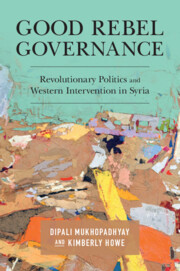‘Insightful in its perspectives and provocative in its diagnostic, this book is superb. Through a theoretically sophisticated study of grassroots organizing and concrete local politics in multiple cities, Dipali Mukhopadhyay and Kimberly Howe provide a remarkable analysis of the Syrian uprising and dislodge many taken for granted accounts of it. They remind us why it's indispensable to revisit one of the most tragic episodes of the Middle East in the twenty-first century.’
Yassir Munif - Emerson College
‘The foundational question of social science - the ‘state of nature’ that perplexed Hobbes and Rousseau - is how political and social order can emerge from anarchic isolation and struggle. Good Rebel Governance makes this primordial question new again by comparing very different approaches to creating order in four Syrian towns after the retreat of the authoritarian state. Coercion and capital come into play, but this study contends that the crucial element is the classic litany’s third ‘c’: social connection in such forms as kinship, ethnicity, religion, locality, and reciprocity.’
Jack Snyder - Columbia University
‘Dipali Mukhopadhyay and Kimberly Howe have written an important and thoughtful book on ‘good rebel governance’ in Syria. They insightfully explore the forms of authority and legitimacy that can emerge in wartime rule, and the serious trade-offs involved in foreign interventions in civil wars. In doing so, they give voice to the experiences of civilians seeking to build a new politics in the face of brutal government repression and the machinations of an international community driven by its own agendas and preconceptions.’
Paul Staniland - University of Chicago
‘Good Rebel Governance is an ambitious and rigorously researched study that exposes the complex local ecologies and the dynamics of the interactions between key opposition groups that arose with the protests of 2011 and the foreign donors and patrons who sought to intervene in the name of ‘democracy promotion’ and regime change. Documenting the variously disastrous wartime reverberations of these collaborations, and the political price of reliance on external support, this fine-grained analysis nevertheless asks us to consider whether fantasies of revolution, even if disappointing or compromised, may still have consequences for Syrians’ futures.’
Lila Abu-Lughod - Columbia University
‘With theoretical sophistication and empirical richness, Mukhopadyay and Howe bring to life a crucial development in the Syrian war: the creation of local councils in rebel-controlled territory. This captivating account demonstrates how insurgent rule is not only shaped by coercive capacities and material resources, but also mediated by varied forms of connection between insurgent rulers and local communities. Brimming with the extraordinary voices of civilians who demanded and worked for better politics, it is required reading for students of rebel governance, foreign intervention, and Syria.’
Wendy Pearlman - Northwestern University



